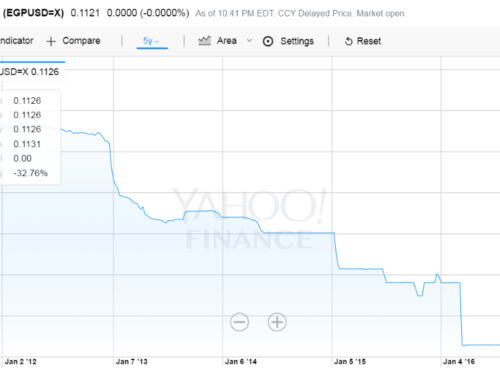
The front-runner in Egypt’s presidential election, which will be held on May 28 and 29, has several clear policy preferences. On the domestic security front, his priority is eradicating the Muslim Brotherhood. In foreign policy, he is appeasing all major international actors while cultivating animosity towards Turkey, Qatar, and Gaza. But an important question remains: What is candidate Abdel Fattah al-Sisi’s economic policy?
Then-General Sisi was appointed by Mohamed Morsi as minister of defensein August 2012 and deposed the president less than a year later. Since then, he has become the dominant figure in Egyptian politics and has been widely touted to run the country. On March 26, Sisi ended speculation about his presidential intentions when he formally resigned from the armed forces and announced his intention to run for president. (In the photo above, Sisi’s supporters rally in Alexandria after he announced his candidacy.) Sisi has already surrounded himself with a team of experts who will promptly churn out an economic policy document over the coming weeks. In the meantime, however, it is possible to obtain clues to his plans from the man himself — by analyzing his past statements, many of which are off-the-cuff and largely improvised.
Sisi: “Has anyone considered giving a month’s salary to help the poor survive? Has anyone thought about going to the university on foot every day to save money for the country? Don’t be upset with me. I see Egypt and its problems. Countries don’t advance with words. They advance with work and perseverance and selflessness and altruism. Perhaps one or two generations will be necessary for the country to live.”
In July 2013, the government of recently-resigned Prime Minister Hazem el-Beblawi, buoyed by an influx of cash from the Gulf, instituted an expansionary policy, increasing debt and spending with hopes of jumpstarting the local economy. Sisi’s thinking seems to run counter to this, favoring an austerity policy that would involve higher taxation (“giving a month” of salary) and less spending on public services (implied by his description of transportation, already underfunded, as a waste of money that needs to be “saved”). There will be none of the quick improvements people are so eager to see; instead, Sisi warns them that no good will come their way — for a long time.
Sisi: “Egypt’s youth are its hope; they need to give and not expect to take anything now…. Egypt needs a lot from us. Egypt’s youth should not be thinking about when will they be able to get married or when will they ‘live.’ They need to build the country first.”
This statement, which uses the same strange definition of “altruism” as the first, is absurd and insulting. With 60 percent of the population below the age of 30, Egypt’s young people aren’t “its hope” — they are Egypt itself. Those youth also represent 69 percent of the total unemployed. How much further can they be expected, and morally asked, to tighten their belts? And if youth are indeed the majority, then for whom are they expected to sacrifice? They’re being asked to put their lives on hold. Even “living” — i.e. marrying and starting a family — is apparently too luxurious an aspiration. Their selflessness is not intended to create a better tomorrow for the children they shouldn’t hope to have, but rather benefits older generations, who have enjoyed the spoils of the country and hope to continue to do so.
Sisi: “There are over 9 million Egyptians living abroad. They all were educated in Egypt’s schools and universities and lived on Egyptian soil. Did any of them think to give one month’s salary for the poor in Egypt?”
Sisi’s view of Egyptian expatriates as a collective cash cow ignores the spending patterns of Egyptian workers. First, the immense majority of expatriates live abroad out of necessity, motivated by mediocre salaries and unemployment at an official rate of 13.4 percent (though the real rate is certainly much higher). The millions of expatriate Egyptians whose wallets Sisi is eyeing work menial jobs, often in harsh conditions, and sometimes inperil of their lives. More importantly, most of those expatriates, a majority of whom are unaccompanied males, regularly send money home to the tune of$19 billion over the past fiscal year. These remittances are one of the major sources of foreign currency, and give the economy a vital boost.
Nevertheless, the government-controlled Association of Egyptians Abroad was very quick to chime in, applauding the speech and putting forth a suggestion for a three-tiered tax on Egyptians working abroad which itsubmitted to the president for consideration. It is likely that some variant of this bill will pass, despite strong doubts about the overall benefits of the tax. Expatriates were prompt to respond, in televised interventions and in social and traditional media, that aside from their already important contribution to the economy, they wouldn’t be working thousands of miles away from their families if they could have found proper employment opportunities near home. By residing abroad, they pointed out, they are saving the government their salary streams and social service expenses; it would be deeply unfair if they were to pay income taxes on money earned abroad if they were receiving no services from the state, since their local expenses are already subject to various consumption taxes.
Candidate Sisi does not promise any sort of improvement in the living conditions of Egyptians any time soon (for “a generation or two” at least, as he puts it). Is this grim realism, or an unwillingness to conduct difficult reforms?
In all likelihood, it’s the latter. His alignment with the big business interests of the Mubarak era, who have already pledged their support to him, entails the restoration of their private interests in public policy. The clearest example of this is the government’s reluctance to reform industrial subsidies. Cutting these subsidies would have relatively little impact on the average citizen and would go a long way to repairing public finance — yet officials continue to focus attention on the need to reduce personal consumption subsidies. Sisi also shows little interest in taking on urgently needed judicial reform, presumably because most members of the third estate are fully aligned with him. For similar reasons, few Egyptians expect him to attempt restructuring the all-important ministry of interior.
Sisi’s economic plan, which is conspicuous for its inability or unwillingness to offer specific solutions beyond a bleak and threatening outlook, can essentially be summarized as a warning to Egyptians to brace themselves for tough times ahead. It is fascinating that a candidate running for elections in a crisis-ridden country seems prepared to promise little more than darkness at the end of the tunnel.
It appears that the senior career officer has little understanding of the needs and pains of the people. Even more crucially, he seems unaware that civilians do not take marching orders the way military troops do. His tone deafness suggests that he will show little inclination to soften his policies.
The question then becomes: Will Sisi’s popularity allow him to push through harsh economic policies? One might argue that the current atmosphere of fawning over the man potentially gives him the needed political capital to pass difficult reforms. But this assumption discounts two important elements.
First, though Sisi completely dominates public discourse, his popularity is largely overestimated. The Muslim Brotherhood and his other most obvious political opponents will reject his policies from the get-go; likewise, the secular opposition and the apolitical masses will have no incentive to tow the line, especially if short term policies bring no relief.
Second, Sisi’s current popularity will quickly ebb if the Egyptian people, who have just endured three years of extraordinary hardship, do not see an immediate improvement in their quality of life. The expectation of an imminent rise in living standards has been fostered, ironically enough, by Sisi’s own grand speeches of the “Egypt will be as important as the world” type.
Indeed, one can easily imagine that Egypt’s economic challenges will hand Sisi his first hard-learned lesson in civilian politics: In a nation where politics is based on personality cults, people will analyze your every word, sometimes read between the lines, and — who knows — even hold you accountable.



